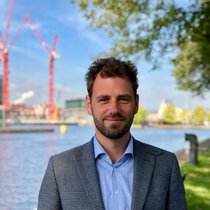The Need for Practical Examples of Design for Values
Amsterdam increasingly harnesses the power of digital technologies like sensors, platforms, and algorithms to manage and maintain various aspects of city life efficiently. Think about traffic, public spaces, law and order.
At the same time, implementing digital technologies may lead to unintended side effects for citizens and can compromise public values. Ensuring responsible and ethical practices becomes imperative. The city has embraced the TADA values since 2016. Also it states that transparency, understandability, human dignity, autonomy, and privacy are guiding principles for smart city solutions. So, what does this look like concretely?
Today, we still lack practical examples of how these values can be effectively designed and integrated into smart city systems.
Who We're Seeking
We are actively looking for TU Delft academics who can offer fresh perspectives and innovative ideas to bridge the gap between public values and smart city technology. If you are passionate about shaping responsible solutions and have expertise in the digital technology domain, we invite you to join us.
“By participating in this Call for Proposals applicants can contribute to building a smarter, more responsible future while gaining valuable research experience and establish meaningful collaborations”
Thijs Turèl
Program Developer & Teamlead
What's in it for You
Participating in our Call for Proposals offers a range of benefits tailored to your academic journey:
- Academic Research Opportunities: Through prototyping, your research can gain new dimensions, opening doors to potential publications and enhancing your academic profile;
- Partnership with the City of Amsterdam: Successful proposals may lead to partnerships with the City of Amsterdam, providing a unique opportunity to test your solution and measure its impact in a real-world context;
- Consortium Building: Your participation in this Call for Proposals can be a significant step toward forming a consortium for future grant applications, leveraging the collective expertise of various stakeholders;
- Professional Support: If selected, you will receive support from a Responsible Sensing Lab (RSL) producer, who will guide you in prototyping and testing your idea.
The Winning Proposal
The winning proposal will receive a budget to prototype its concept with the assistance of a Responsible Sensing Lab (RSL) producer. This includes producing a prototype and communication materials such as a short movie, animation, and professional photoshoot. Once the prototype is completed, we will facilitate your introduction to the relevant department at the municipality of Amsterdam for the presentation of your idea.
The prizes for the competition are as follows:
- First prize: A production budget of 20,000 euros
- Second prize: A production budget of 10,000 euros
Furthermore, winners will receive collaboration support with the city of Amsterdam and assistance in producing communication materials for their solution/prototype. The allocated budget can be utilized to hire a design agency, prototyping firm, software developer, or other relevant professionals. The RSL producer will collaborate with you to manage the budget effectively.
Requirements and Areas of Focus
To be eligible for the Call for Proposals, your idea should meet the following criteria:
- Digital Technology in Public Space: Your idea should focus on digital technology in public space or public infrastructures in the city. This can involve digital tech that the city uses in its own work or digital technology that manifests itself in the city;
- Focus on Public Values: Your proposal should address a challenge or opportunity related to a public value that is currently underrepresented in smart city solutions. While we have previously explored privacy and transparency, we encourage proposals that explore other public values;
- Tangible Solution: Your idea should be concrete enough to be mockup-ed or prototyped. This will enable us to materialize and evaluate its effectiveness;
- Citizen-Centric Approach: The prototyping process should include some form of evaluation involving people, enabling iterative design improvements.
Furthermore, we are seeking solutions that address the socio-technical aspects of smart city and sensing systems. This includes various elements, such as:
- The hardware layer involved in these systems;
- The software layer utilized in smart city and sensing systems;
- The design of citizen interfaces for seamless interaction;
- Alternative working instructions.
We encourage proposals that consider these multifaceted aspects and offer innovative solutions to enhance the socio-technical systems within smart cities.
